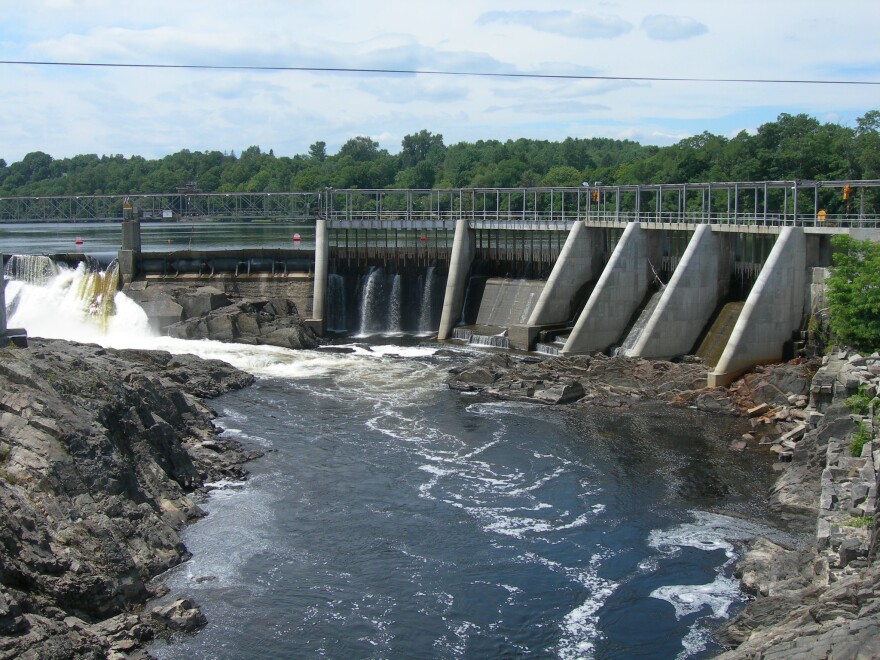Brookfield Renewable has shut down three of its four hydroelectric dams on the Kennebec River, after federal regulators warned that the company was in danger of killing endangered Atlantic Salmon without authorization.
Brookfield is at the center of a dispute with conservationists and government agencies over whether some or all of the dams should be removed, in order to help the salmon survive, or whether other actions such as installing fish ladders or elevators can do the job.
It's been more than a year since federal regulators rejected Brookfield's proposed replacement for an expired species protection plan. And last month federal fisheries officials warned that the company no longer had authority under the Endangered Species Act to "take" — that is, kill — salmon passing through its facilities.
With young salmon migrating to the sea for the first time, Brookfield has shut down the turbines in three of the dams.
"So that includes a full station shutdown from May 5th, through May 31st to the Lockwood, Hydro-Kennebec and Shawmut hydro projects on the lower Kennebec River," says Brookfield spokeswoman Miranda Kessel. "Taking these measures really demonstrates we are doing everything we can to protect the downstream migrating species."
Kessel says the fourth dam, called Weston, will continue to operate, because studies show the salmon stand a better chance of survival passing through the turbines than when they spill over the top of that dam.
She declined to say how much electricity or revenue Brookfield could lose from idling the turbines.
"But given that we're going to be shut down for three weeks the impacts will be substantial," Kessel says.
Conservationists say the shutdown is just the latest evidence that Brookfield will go to extremes in order to delay compliance with the Endangered Species Act.
Nick Bennett is senior scientist at the Natural Resources Council of Maine (NRCM), one of several groups in the Kennebec Coalition which wants to see the dams removed. He says state biologists have been reporting the onset of downstream salmon runs for weeks.
"They've waited too long to have these measures be most effective," Bennett says.
And Bennett says Brookfield's latest filing with the Federal Energy Regulatory Commission, which has ultimate authority over the hydroelectric facilities, understates fish mortality caused by the dams. He says Brookfield is ignoring young salmon, known as smolts, which gather in the dam impoundments where invasive smallmouth bass make a feast of them.
"Smallmouth bass love impoundments, they're very well designed to thrive in impoundments," Bennett says. "On the other hand, the smolts are not great swimmers; they're built to be helped out to the ocean by river currents. They're slow moving. And do so they're not fast enough to escape from the smallmouth bass."
Bennett estimates that less than 60% of the smolts make it past the dams.
Kessel says impoundments are beyond the company's scope of responsibility.
"Mortalities that occur within the river or within the impoundment are subject to natural predation which occur outside the operations of a run of river hydro project," Kessel says.
In an email, an official at the National Marine Fisheries Service (NMFS) said the dam shutdown was a useful move.
"We are glad to see that Brookfield is taking action to reduce the loss of endangered juvenile Atlantic salmon at their projects and expect that turbine shutdowns will reduce mortality, however, we have not yet had the chance to fully evaluate the recent filings," wrote Matt Buyhoff, NMFS' Atlantic Salmon Recovery Coordinator.
"It's difficult to evaluate NRCM's assessment (of impoundment mortality) without full context," he added. "In general, we do anticipate that mortality occurs in the project impoundments, however, we do not have sufficient information at this time to identify discrete sources of mortality within the impoundments. As such, potential remedies are less clear."
Earlier this year, the state Department of Marine Resources (DMR) dropped efforts to enact a new management plan for the entire river, after Brookfield filed a Lawsuit saying the agency was overstepping its authority. DMR is promising a new stakeholder process. Brookfield says it plans to file a new species protection plan next month, a move which will trigger further review by federal regulators.


